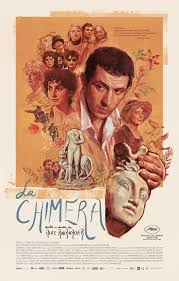
LA CHIMERA
Italy, 2023, 130 minutes, Colour.
Josh O’Connor, Carol Duarte, Isabella Rossellini, Alba Rohrwacher, Lou Roy-Lecollinet
Directed by Alice Rohrwacher.
Response to La Chimera may very much depend on mood and frame of mind as we choose to watch it.
The film has had some glowing reviews and Festival awards, with words like “poetic”, “magical”, being used to praise it. So, for the poetic frame of mind, no worries. But for audiences who might subscribe to a more prosaic, realistic frame of mind, perhaps not.
We are in Italy, a remote part of Tuscany, industrial, docks, poorer, dilapidated abandoned railway station, makeshift huts on mountainsides. There is a town, the streets, the cafe, but hard times.
The film was written by Alice Rohrwacher, a director with a strong reputation (Happy as Lazzaro). The star is the British actor, Josh O’Connor (Prince Charles in The Crown, Challengers), and a cast of Italian actors with an enjoyable cameo by Isabella Rossellini as a retired singer, demanding matriarch.
In the plot, while the setting is remote, the source of income is much more remote. It is treasure from buried in Etruscan tombs, with the locals digging them up, fixing and mending, and negotiating with an unseen dealer who markets them to wealthy international collectors.
So what is an Englishman doing in this setting? He is an archaeologist with a gift for divining the buried relics (using a forked branch). But he has lost his love, longing for her, dreams of her, and is returning to the town after serving a prison sentence.
He is taciturn, sombre, going to visit the singer but trying to avoid his ragtag band of past collaborators. But he does go back to divining, is attracted to the singer’s maid – and loosens up a little, but generally, a morose hangdog look.
.
There is background drama with the town’s characters, some comic touches (action speeded up at one stage in the character giving her opinion straight to camera). The critics have praised the evocative cinematography, the poetic aspects. And then there is a cameo from veteran actress Alba Rohrwacher (the director’s older sister) in an unexpected character.
There is some excitement towards the end with a significant discovery of a shrine in statue of goddess – and criminal shenanigans and small wheeler- deals.
An unexpected and offbeat drama.
- The title? The visual images and cards?
- The Italian setting, Tuscany, the remote town, the docks, the streets, the cafe, the abandoned railway station, ramshackle homes, makeshift huts on the mountains? The contrast with the city, the buildings, business dealings, the yacht on the lake, the option? The musical score, the range of songs and their lyrics illustrating the themes?
- Critical acclaim, poetic and magical? Festivals and awards? For the poetic imagination? Not for the realist imagination?
- The introduction to Arthur, in the train, with the young women, his comments, flirting, the salesman and his attack, comment on his smell? The white suit? The dream, his lost love? The mystery of an Englishman in Italy? The mysterious, poetic, dream sequences throughout the film, and the reprise of this same journey and characters later in the film?
- His arrival in the town, his friends meeting him, his not wanting to join them, is going to Flora’s house, the discussions with her, the lost love and the memories, the symbolism of her face, the son following them, the red thread on the ground and the later snapping of the thread after he sees it in the cave?
- His going to his makeshift huts, trying to settle back, meeting up with the friends, their work, personalities, the preparation for the Festival, the masks, the town and rejoicing?
- Arthur, his background, archaeology, his knowledge, the forked branch, trees upturned, the maid seeing them, pulling them out, the signals for the buried relics? upset? But his returning to the divining, finding the tombs, the contents, in the town, the group mending and fixing, the contact with Spartaco, Arthur indebted to Spartaco, going into the city and the office, the financial deals, not seeing Spartaco, meeting with her niece?
- The character of Italia, her background, her two children, the daughter older, the sleeping boy, concealing them? Wanting to sing? Serving as a maid to Flora? Flora and her household, the various women, their arguments? The visit to the railway station, her leg, the wheelchair? The railway station abandoned?
- Arthur, the attraction to Italia, going out with her, the Festival, the dancing, on the shore, the the sand above the hidden tombs, the discovery of the grave, her threatening the police,?
- Arthur and the discovery, in the tunnel, the shrine, the statue, the gifts? To get them out, breaking off the head? The seeming police? Spartaco’s henchmen disguised as police? Their getting the statue, packing it, transferring it to the yacht?
- Italia, the children, setting up a centre for them in the abandoned station, redecorating it? Her collaborators?
- The information about the yacht, Spartaco and her niece and explanations, the scenes of the auction, the wealthy clientele, Spartaco as a woman, her dress and style? The group coming to the auction, the intrusion, trying to bargain with Arthur, his mood, exasperation, throwing the head into the sea, the scene of drowning at the bottom of the sea?
- The consequences for the group? The consequences for Arthur? The presence of the police throughout but their not being able to convict?
- Arthur, his wanderings, finding the new cave, exploring, the thread and memories of his love?